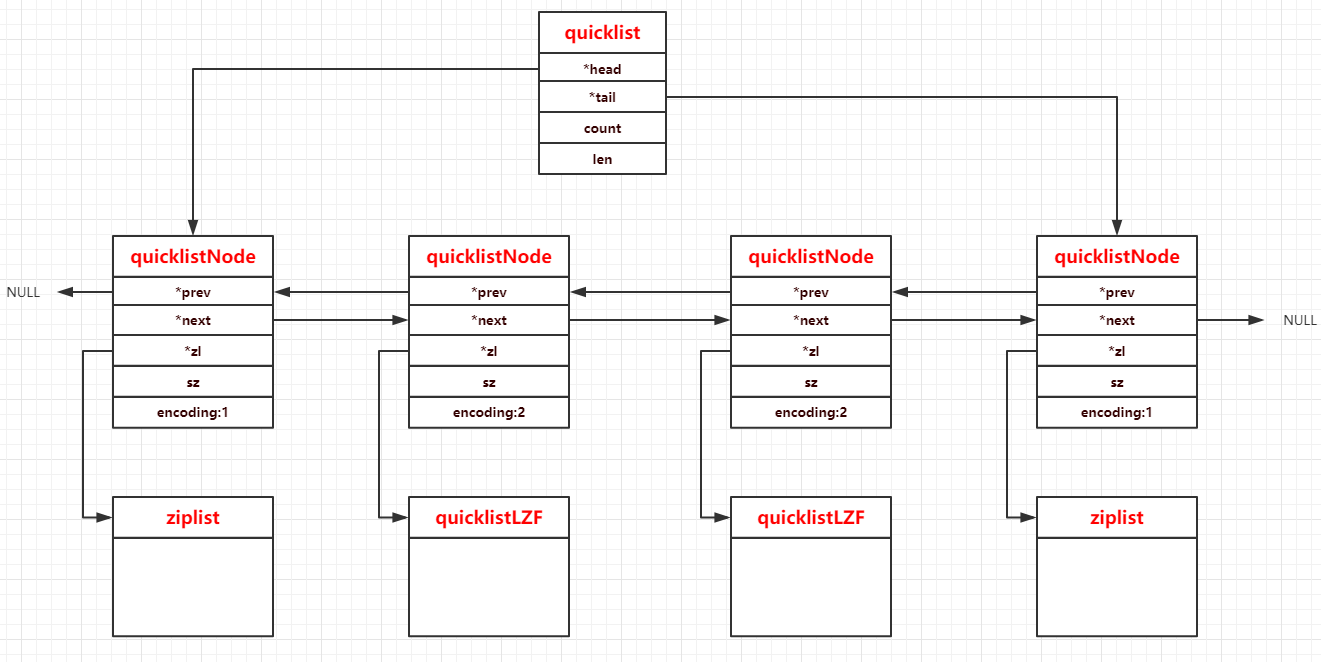1
2
3
4
5
6
7
8
9
10
11
12
13
14
15
16
17
18
19
20
21
22
23
24
25
26
27
28
29
30
31
32
33
34
35
36
37
38
39
40
41
42
43
44
45
46
47
48
49
|
quicklist *quicklistCreate(void);
quicklist *quicklistNew(int fill, int compress);
void quicklistSetCompressDepth(quicklist *quicklist, int depth);
void quicklistSetFill(quicklist *quicklist, int fill);
void quicklistSetOptions(quicklist *quicklist, int fill, int depth);
void quicklistRelease(quicklist *quicklist);
int quicklistPushHead(quicklist *quicklist, void *value, const size_t sz);
int quicklistPushTail(quicklist *quicklist, void *value, const size_t sz);
void quicklistPush(quicklist *quicklist, void *value, const size_t sz,
int where);
void quicklistAppendZiplist(quicklist *quicklist, unsigned char *zl);
quicklist *quicklistAppendValuesFromZiplist(quicklist *quicklist,
unsigned char *zl);
quicklist *quicklistCreateFromZiplist(int fill, int compress,
unsigned char *zl);
void quicklistInsertAfter(quicklist *quicklist, quicklistEntry *node,
void *value, const size_t sz);
void quicklistInsertBefore(quicklist *quicklist, quicklistEntry *node,
void *value, const size_t sz);
void quicklistDelEntry(quicklistIter *iter, quicklistEntry *entry);
int quicklistReplaceAtIndex(quicklist *quicklist, long index, void *data,
int sz);
int quicklistDelRange(quicklist *quicklist, const long start, const long stop);
quicklistIter *quicklistGetIterator(const quicklist *quicklist, int direction);
quicklistIter *quicklistGetIteratorAtIdx(const quicklist *quicklist,
int direction, const long long idx);
int quicklistNext(quicklistIter *iter, quicklistEntry *node);
void quicklistReleaseIterator(quicklistIter *iter);
quicklist *quicklistDup(quicklist *orig);
int quicklistIndex(const quicklist *quicklist, const long long index,
quicklistEntry *entry);
void quicklistRewind(quicklist *quicklist, quicklistIter *li);
void quicklistRewindTail(quicklist *quicklist, quicklistIter *li);
void quicklistRotate(quicklist *quicklist);
int quicklistPopCustom(quicklist *quicklist, int where, unsigned char **data,
unsigned int *sz, long long *sval,
void *(*saver)(unsigned char *data, unsigned int sz));
int quicklistPop(quicklist *quicklist, int where, unsigned char **data,
unsigned int *sz, long long *slong);
unsigned long quicklistCount(const quicklist *ql);
int quicklistCompare(unsigned char *p1, unsigned char *p2, int p2_len);
size_t quicklistGetLzf(const quicklistNode *node, void **data);
int quicklistBookmarkCreate(quicklist **ql_ref, const char *name, quicklistNode *node);
int quicklistBookmarkDelete(quicklist *ql, const char *name);
quicklistNode *quicklistBookmarkFind(quicklist *ql, const char *name);
void quicklistBookmarksClear(quicklist *ql);
|
